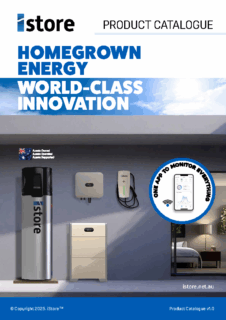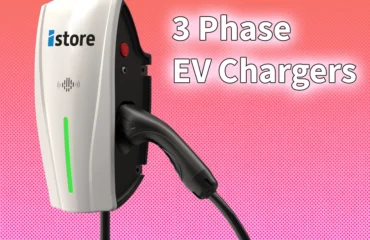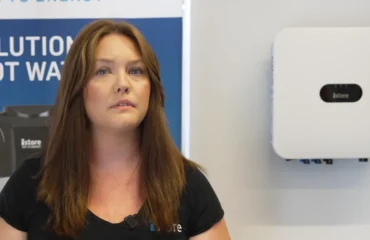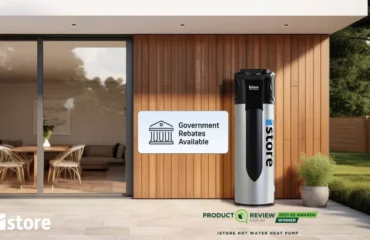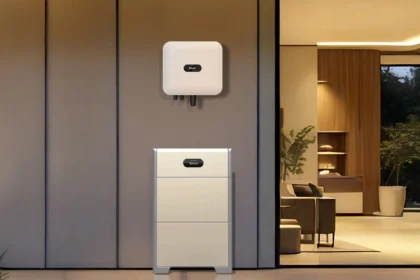
Longer summers. Rising energy prices. Bigger power bills.
If you’re building or upgrading a house, solar energy should be at the forefront of your mind to combat these growing pressures.
But solar panels are only half the story. Solar batteries are fast becoming the must-have addition for households that want to store power, use more of their own energy, and reduce reliance on the grid.
Proudly Australian-owned, iStore offers high-performing, reliable, and competitively priced solar batteries for houses in our great country.
Why are solar batteries worth the investment, how do they benefit both builders and homeowners, and why is iStore’s range the ideal choice? We’ll discuss all that and more!
What Is a Solar Battery for a House?
Solar panels generate electricity during the day when the sun is shining. The home immediately uses the electricity it needs to power lights, appliances, and anything else running.
Around midday, when the sun is strongest, solar panels tend to generate more electricity than a household needs. Instead of sending that excess electricity back to the grid, a solar battery stores it.
This battery connects to a solar inverter, which turns solar energy into usable electricity.
Solar panels stop producing power once the sun goes down. At that time, the battery sends the stored energy into the home to keep everything running. If the battery runs low, the house will automatically draw power from the grid as a backup.
Why Solar Batteries Are Essential for Modern Houses
Power Backup
Think of a solar battery as a home’s personal energy reserve. Once the sun goes down, the battery steps in to keep lights on and appliances running.
In the event of a power outage, having backup energy from a solar battery gives peace of mind—no scrambling for candles or worrying about food spoiling!
Builders offering homes with battery backup show homeowners that they’re building with comfort, reliability, and modern living in mind.
Lower Electricity Bills
A solar battery stores the excess energy a home’s solar panels produce during the day so that the home can rely less on the grid and, in turn, pay less for electricity.
In peak hours (typically early mornings and evenings) when electricity rates are higher or on cloudy days when the panels aren’t generating enough energy, a home can use the stored energy from a solar battery instead of expensive grid electricity.
For homeowners, this means lower bills and more control over their energy use. For builders, it’s a great way to offer clients long-term savings and boost the value of a home.
Sustainability
Australian homes significantly contribute to the nation’s carbon emissions, accounting for over 10% of total emissions and around 24% of overall electricity consumption. This substantial reliance on fossil fuels, which release greenhouse gases, drives climate change.
Integrating solar batteries into residential properties offers a practical solution to this issue. Enabling homeowners to utilise renewable energy even when the sun isn’t shining reduces dependence on fossil fuel-based electricity, leading to a direct decrease in household carbon emissions.
Homeowners benefit by reducing their carbon footprint and participating in global efforts to combat climate change while enjoying the reliability and cost savings associated with renewable energy.
Builders incorporating solar batteries into new constructions abide by sustainable building practices and enhance a property’s appeal to environmentally conscious buyers.
Key Benefits of Solar Batteries for Houses
For Builders
- Buyer Appeal: Attract buyers with sustainable, energy-efficient homes.
- Property Value: Add long-term value to properties with built-in renewable energy solutions.
- Cost Savings: Help buyers save money on electricity costs.
- Flexibility: Future-proof homes with modular battery systems that can scale to meet the rising demand for eco-friendly living.
- Market Edge: Stand out in a competitive market by offering smarter energy features.
- Compliance: Support compliance with evolving building regulations focused on energy efficiency.
For Homeowners
- Self-Sufficiency: Use more solar power instead of relying on the grid.
- Bill Reduction: Lower your electricity bills by tapping into stored energy, especially during peak times.
- Long-Term Savings: Enjoy long-term energy savings and independence from rising power prices.
- Backup Power: Keep essentials running during blackouts with stored energy.
- Sustainability: Reduce your carbon footprint by using clean, renewable energy.
- Property Value: Increase your home’s value with a solar battery system.

Why Choose iStore’s Solar Batteries for Houses?
Integration with Other Solar Solutions
iStore solar batteries for houses are compatible with iStore hybrid solar inverters, creating a complete solar energy system to power a home.
With this setup, solar panels generate energy from sunlight, the hybrid inverter converts that energy into usable power, and the battery stores any excess power for later use.
All iStore components work together to keep a home powered all day, every day, without relying as much on expensive grid electricity. In some cases, such a setup can remove the need for grid electricity entirely!
The seamless integration between iStore solar products also means easier and faster installation, better energy efficiency, and simpler system monitoring through the iStore app.
Energy Efficiency
iStore solar batteries for houses are made of lithium iron phosphate (LFP). LFP batteries are one of the most energy-efficient battery types on the market.
While some solar batteries only allow access to 80–90% of the energy they store, our LFP solar battery provides 100% usable capacity. Households get the full benefit of what the battery stores without waste.
The battery also has built-in energy optimisers that maximise its usable energy by more than 10% over its lifecycle. These optimisers reduce energy loss and stress on the battery and help it run more efficiently over time.
Durability and Safety
iStore solar batteries for houses can withstand Australia’s diverse climate, operating effectively in temperatures ranging from -20°C to 55°C.
Lithium iron phosphate batteries are known for being safer and more stable than other lithium-ion batteries. They have four layers of built-in protection, including temperature sensors that monitor and adjust the battery’s load to prevent short circuits, overcharging, overheating, and other potential faults. Another safety feature is a self-extinguishing component in the unlikely event of thermal runaway or internal fire.
Affordability and Cost Savings
Every Australian household should have access to solar energy. That’s why we offer high-quality solar batteries at affordable, competitive prices without sacrificing performance.
Our solar batteries for houses balance upfront affordability and long-term value. They are built to last, with fewer moving parts requiring minimal maintenance. This durability means
they deliver reliable performance year after year, giving buyers more return on their investment.
So, while a solar battery is an initial investment for homeowners, keep in mind that it pays for itself over time by reducing a home’s energy bills.
For builders, an iStore solar battery is an easy way to add long-term value to a home without blowing out the construction budget.
Scalable Design
Each iStore solar battery is a stackable module weighing 50kgs with a capacity of 5kWh (kilowatt-hours). Connecting two modules creates a 10kWh battery, and connecting three modules gives you a 15kWh battery. For even more storage, you can connect two sets of 15kWh batteries side by side to achieve a maximum capacity of 30kWh.
The modular system makes it easy to upgrade a home’s solar storage. Homeowners can add more battery units without having to replace the entire system when their energy needs change, such as adding a granny flat to their property or buying an electric car.
Even if a home has multiple iStore battery modules for high storage needs, each 5kWh module operates independently. This setup keeps the system balanced and running smoothly, making it more reliable.
Sleek, Modern Look
No one wants clunky tech ruining a clean home design and vibe!
The iStore solar battery’s sleek, modern, and compact design doesn’t draw attention or take up unnecessary space. It blends effortlessly into a home, wherever it is installed.
User-Friendly Features
The iStore WLAN dongle makes it easy for homeowners to get the most from their solar setup. This small device connects an iStore hybrid solar inverter and a solar battery system to a home’s Wi-Fi network.
Users can then remotely monitor and control how much energy their solar panels produce, how much their battery stores, and how much power their home uses via cloud-based platforms and mobile apps.
Commitment to Sustainability
iStore is committed to sustainability and supporting Australia’s renewable energy goals.
We were pleased to announce in September 2024 that our battery range complies with the “Equipment Requirements” released by the NSW government in conjunction with the Independent Pricing and Regulatory Tribunal. IPART is an independent authority responsible for regulating prices and monitoring service delivery across various sectors, including electricity.
NSW Climate and Energy Action states, “Installing more batteries across NSW will help make the grid more reliable and stable while reducing our reliance on fossil fuels during periods of peak demand. This will help reduce NSW’s emissions by 70% by 2035 and achieve net zero by 2050.”
What does this mean for iStore customers?
iStore CEO Eliese De Oliveira explains, “We know from experience that these schemes are very effective in generating better accessibility for homeowners wishing to enhance their sustainability by purchasing a battery. The scheme will see NSW property owners who utilise the rebate reduce their power bills while contributing to our collective net-zero targets.”
Local Expertise
iStore is a proudly Australian-owned, family-run company with over 25 years of experience in the solar and water heating industries. We understand our customers and what they need from solar products.
Affordability
Long-term value
Safety
Reliability
Durability
Scalability
Performance monitoring and control
Strong warranties (10 years!)
Technical support
Installation and user manuals
Access to local solar experts and technicians
Choosing the Right Solar Battery for a House
What should you consider when choosing a solar battery for your home or a client’s?
- What size battery does the house need?
Check how much energy your household uses daily. You can find this on your electricity bill, usually in kilowatt-hours (kWh).
For a home under construction, you’ll have to research how much electricity a home of similar size uses. As an example, the average Australian household of four uses about 22kWh a day.
Choose a battery that can cover the household’s evening and overnight usage—typically around half their daily total. So, for 22kWh usage a day, a 10–15kWh solar battery would be suitable.
- Is the battery compatible with the existing solar energy system setup?
If the home already has solar panels and an inverter, you must select a compatible solar battery.
For systems with a standard string inverter, you may need to install a separate battery inverter to connect a battery. However, if the system already includes a hybrid inverter—which handles both solar and battery inputs—it’s much easier to add a battery.
- Are the battery’s materials durable and safe?
Choose a battery made from stable, long-lasting materials like lithium iron phosphate. These batteries are known for their safety, thermal stability, and long lifespan, which is especially necessary in Australia’s sometimes harsh climate.
- Can the battery system be scaled later?
If a home’s energy needs will increase over time, a modular battery system allows the addition of more battery units and storage without replacing the entire setup. This option is perfect for growing families.
- Is the price reasonable?
Look for value, not just the cheapest option. A good-quality solar battery may cost more upfront but will save users more in the long run with better performance and efficiency.
- Is the brand reputable?
Research brands with a proven track record, local support, and a solid warranty. A trusted name with good reviews and Australian-based customer service makes all the difference if you need help with the system down the line.
Installation and Maintenance of Solar Batteries for Houses
A professional, certified installer must install a solar battery system to ensure it meets all local building codes and safety regulations and to avoid potential legal and safety issues. Proper installation also maximises system performance and efficiency.
Here’s how the installation process generally goes.
- Site Assessment: The installer evaluates the home’s current solar setup, electrical system, and space availability to determine the best location and compatibility for the battery.
- System Design: They create a tailored plan, specifying the battery size, placement, and integration method with existing solar panels and the inverter.
- Permits: They obtain the necessary permits to comply with local regulations and safety standards.
- Electrical Upgrades (If Needed): The home’s electrical panel may require upgrades to support the new battery system.
- Battery Mounting: The installer mounts the battery to a wall. Common installation spots are garages, undercover carports, or other areas protected from heat, moisture, and dust.
- Electrical Integration: They then connect the battery to the solar inverter and install a safety disconnect, which is a switch that allows homeowners or technicians to quickly and safely shut off power to the solar battery for maintenance and emergency shutdowns.
- System Configuration and Testing: The installer configures and tests the entire setup to make sure the battery charges and discharges correctly and everything functions safely.
Once the battery is installed, maintenance is vital to keep it running consistently and safely.
We’ve designed our solar batteries for minimal maintenance.
- Weekly: Monitor the system’s performance through the iStore app, which works via the iStore WLAN dongle. Look for anything unusual, like lower-than-usual charge levels, the battery not discharging when expected, or error notifications.
- Monthly: Check the battery for cracks, dents, corrosion on terminals, loose cables, and signs of water damage, especially if it’s installed outside.
- Every 1–2 Years (Or As Needed): Arrange a professional service every year or two. Contact a certified technician immediately to address any irregularities or issues.
FAQs
What Is the Best Solar Battery for a House?
The best solar battery for a house is one that matches the household’s energy needs, works with the house’s existing solar setup, and offers reliable performance, safety, and long-term value.
Lithium iron phosphate (LFP) batteries are a top choice for most homes due to their stability, long lifespan, and high efficiency.
How Much Does a Solar Battery Cost for a House in Australia?
The cost of a solar battery in Australia varies based on capacity and brand.
Residential solar batteries typically range from $1,000 to $1,300 per kilowatt-hour (kWh) storage capacity. For instance, a 10 kWh battery might cost between $10,000 and $13,000.
Some Australian states offer rebates or incentives to reduce the upfront cost of solar batteries for houses. In NSW, for example, rebates can lower the price of a solar battery by $1,600 to $2,400.
What Size Solar Battery Do I Need for My House?
Check your power bill to find out how much electricity your household uses daily in kilowatt-hours (kWh).
Then, choose a solar battery that can cover your home’s evening and overnight usage, usually around half your daily total. For example, if you use 30kWh a day, a 15kWh battery will suffice.
How Many Solar Batteries Are Needed To Power a House?
The number of solar batteries needed to power a house depends on the home’s energy consumption, the capacity of each battery, and whether the household is aiming for full energy independence or just backup during outages.
While a 5kWh battery is insufficient to run an entire house, it can power essential household appliances, such as lights, a refrigerator, and a few electronics, for approximately 6–10 hours.
A 10kWh solar battery can power essential household appliances for approximately 10–12 hours.
So, generally speaking, installing two or three 5kWh solar batteries is enough to sufficiently power a house until solar production resumes or grid power is restored.
Can I Install My Own Solar Battery System?
Installing a solar battery system is subject to strict regulations to ensure safety and compliance. The Clean Energy Council (CEC) mandates that only accredited professionals can install battery energy storage systems.
Attempting a DIY installation without proper accreditation can lead to significant safety hazards and may violate local laws.
Which Type of Battery Is Best for Solar?
Lithium iron phosphate (LFP) batteries are widely considered the best solar battery. They’re safer, more stable, last longer, and perform better in high temperatures.
Why iStore Solar Batteries Are Perfect for Powering Homes
If you’re building a home for a client, including an iStore solar battery helps deliver a sustainable, energy-efficient home—the kind buyers love to live in. Happy clients mean glowing reviews, more referrals, and a reputation for building homes that perform.
If you’re upgrading your home’s solar energy system, an iStore solar battery gives you more energy control, lower bills, and reliable power whenever you need it.
iStore has the solar battery solution that builds better living.
Explore our solar batteries for houses online and then get in touch for a consultation or quote by calling 1300 515 640 or filling out this online form.

